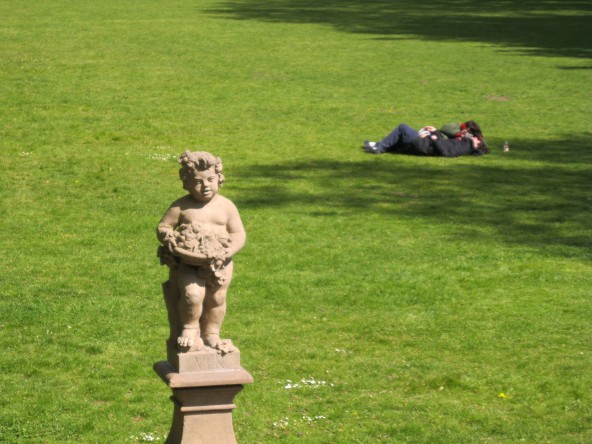
Ludwig van Beethoven wrote this love song called “Ich liebe dich” (naturally) in 1795 when he was just 25 years old. At that time Vienna’s music circles began to notice him. The composer still had six years to go until he was able to finish his first symphony.
The song’s lyrics are a poem by the pastor Karl Friedrich Wilhelm Herrosee, a contemporary of Beethoven who wrote mainly church songs.
The grammar:
The text is a tender declaration of love, sprinkled with the pronouns ich, dich, du, mich, dir, mir, sie, and uns. They indicate that love is an intensive giving and taking. “Ich” and “du“ are always connected with a verb, in this case they love (ich liebe, du liebst). “Mich” and “dich” are never active, they always receive the action. These different words allow us a different word order depend on the context: “Ich liebe dich” has the same meaning as “Dich liebe ich”.
The pronouns dir and mir play another role in the sentence and, hence, they appear in dative. In the third stanza the narrator wishes God’s blessing “über dir”, marking a position (über = above) where we have to apply the dative pronoun dir (instead of du or dich). Two lines further down, the narrator asks God to keep (erhalten) the lover “to me”, marking an indirect object which takes the dative as well: Gott erhalt (keep) dich (you) mir (to me).
Eventually, in the last line after the back and forth of du, dich and ich, mich we finally reach uns (us), a love poem’s ultimate goal.
The vocabulary:
die Sorge = worry
ertragen = to bear, to endure
der Kummer = sorrow, heart break
die Klagen = (here) lament
trösten = to comfort, to console
schützen = to protect
You can follow text and music with the YouTube link below, the interpretation by Dietrich Fischer-Dieskau.
I.
Ich liebe dich, so wie du mich,
Am Abend und am Morgen,
Noch war kein Tag, wo du und ich
Nicht teilten unsre Sorgen.
We use so when we compare two persons, things, or activities when they are the same.
I love you as (so) you love me.
In the third line, the poet uses wo (where) as an relative pronoun where he could (and maybe should) have used “an dem”. However, wo goes with so in the first line. What means grammar to a poet when it disturbs the music of the language?
II.
Auch waren sie für dich und mich
Geteilt leicht zu ertragen;
Du tröstetest im Kummer mich,
Ich weint in deine Klagen.
The word sie in the first line is a pronoun as well. It represents the Sorgen (plural). Twice we find the simple past:
trösten (to console) = trösteten, ich tröstete, du tröstetest (hard to pronounce that’s why we often use the perfect tense in spoken language: du hast getröstet.)
weinen (to cry) = weinten, ich weinte. Here, the poet drops the “e” at the end, a little sacrifice to the flow and the music of the language.
III.
Drum Gottes Segen über dir,
Du, meines Lebens Freude.
Gott schütze dich, erhalt dich mir,
Schütz und erhalt uns beide.
The word drum is a contraction for darum (It means “therefore” or “that’s why” – parents react to their children’s question “warum?” often with “darum”.)
In the second line we encounter the grammatical case that involves possession: joy of my life = Freude meines Lebens, here in the “poet’s genitive, “meines Lebens Freude”.
In line three and four, the narrator asks God to do something (schützen, erhalten) in imperative:
schütze or schütz, and erhalt. Here, in imperative no du is involved.

